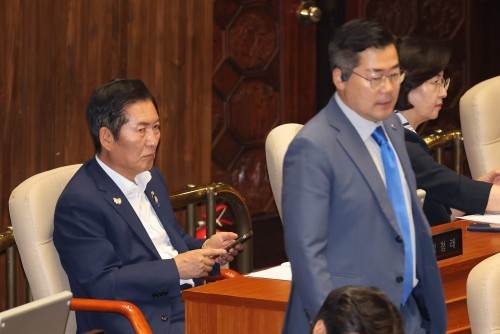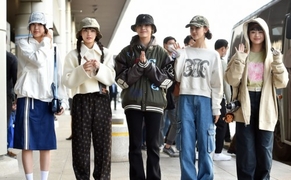 |
| Jung Chung-rae (left) and Park Chan-dae / Source: Yonhap News |
After a brief pause due to flood recovery efforts, the battle for leadership within the Democratic Party of Korea is back in full swing. Lawmakers Jung Chung-rae and Park Chan-dae, both vying for the party’s top post, are doubling down on hardline stances regarding prosecution reform in a bid to win over the party faithful.
On July 24, Jung posted on Facebook, “As long as we have judges like Ji Gui-yeon and other sedition suspects repeatedly walking free due to rejected arrest warrants, we need a Special Sedition Tribunal.” He added, “Those obstructing the eradication of sedition are simply accomplices. I will push to establish a special court to deal with these cases.”
The proposal to establish a special court for sedition cases is also part of a special sedition bill authored by Park. At present, such cases are being handled by the Seoul Central District Court’s Criminal Division 25, presided over by Judge Ji Gui-yeon — the same judge who rejected a warrant for former President Yoon Suk-yeol’s arrest in March, sparking backlash among Democratic Party supporters.
On the same day, Park held a press conference at the National Assembly, declaring, “I will expose the full extent of case fabrication committed under Yoon Suk-yeol’s prosecution,” and pledged to introduce a “Prosecution Truth Commission Act.”
Park accused the former administration’s prosecutors of attempting to fabricate evidence against President Lee Jae-myung, conducting over 400 raids without success, and then proceeding with “reckless indictments based on distorted evidence and tainted testimony.” He added, “Their fragmented indictments didn’t just target Lee personally but amounted to a deliberate assault on democracy itself.”
Park said the proposed law would impose full accountability — including disciplinary action, impeachment, and prosecution — for investigators found guilty of unjust probes or indictments. He also vowed to revive a bill eliminating the statute of limitations for state-led crimes such as prosecutorial abuse, allowing victims to receive proper restitution and ensuring retrials in confirmed cases of fabrication.
“If political prosecutors fabricated cases or testimony, then the law must be applied without exception,” Park emphasized. “That includes the probe targeting President Lee.”
Both candidates also competed for support from President Lee’s loyal base, often referred to as the “Myung-sim” vote.
Jung wrote on Facebook, “No regime can overcome the people, and no party can overcome its members. Now is the time to unite around President Lee and our party members.”
Park, responding to criticism he had directed at Kang Sun-woo, the former nominee for minister of gender equality and family, said, “It was something that had to be said. I thought long and hard, but I’m willing to do anything for the success of the Lee administration.”
He added, “People often ask where ‘Myung-sim’ lies, but we must remember that it lies with the people.” Still, he acknowledged, “The president’s inclinations could influence the outcome of this leadership race.”
Most Read
-
1
-
2
-
3
-
4
-
5
-
6
-
7





















